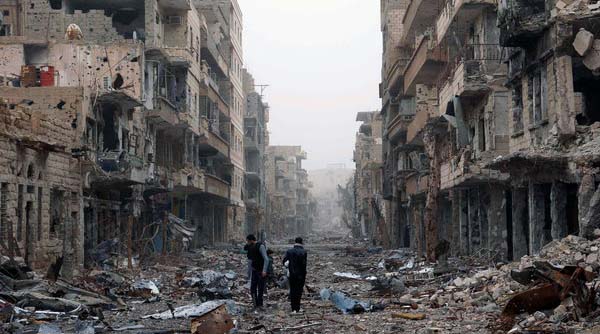On Friday, June 14, Hezbollah Secretary General, Sayyed Hassan Nasrullah said in a televised speech said that his organizations has decided to interfere in the Syrian crisis and participate in the battles on the ground in order to stand against a project targeting Lebanon and the region.
"We are the last to interfere in Syria, way after the Future Movement interfered there and other Lebanese organizations that I don't want to name," he alleged during a ceremony held by Hezbollah for the occasion of the Injured Fighter Day. "If today we interfere on the side of the Syrian rebels, wouldn't they praise us as heroes?" Nasrallah wondered.
"So it is not about intervention or not, it is about a plan for bringing down the regime. Those who want to bring down Syria, want to bring down Lebanon and the rest of the region and put it under the control of the Israeli-American-Takfiri powers" he said. He also mentioned Sunni radicals who called for a war against Hezbollah after revelation that the organization is involved in ground fighting against rebellions.
He also clarified that Hezbollah's involvement was completely transparent and open, "We declared it openly. It's not as if we sent our men to Syria and said we're delivering milk and blankets, and it's not as if we buried our men in Syria and silenced their relatives in Lebanon." The organization justified its involvement saying that it wanted to defend villages along the border where Lebanese Shiites live. Nasrullah also said that most Syrians support their regime but only few members among the oppositions who have been exploited by some undemocratic states in the region on the pretext of democracy and the Arab Spring.
In reaction to Hezbollah’s involvement, Saad Hariri said that it defied country’s law and granted itself the right to make crucial decisions on behalf of the nation by sending thousands of fighters to Syria to support President Assad.
It is feared that increasing involvement of Hezbollah to support Syrian regime and flow of Sunni radical from the country to stand beside oppositions will finally destroy the present sectarian co-existence in Lebanon.
The engagement of Hezbollah become so highlighted after reports released that without its full support, recapturing Al-Qasair city was difficult for Syrian soldiers. After victory, the United States asked Hezbollah and Iran to avoid interfering to Syrian domestic issue in spite of open and secret interference of other countries in support of rebellions. It is widely believed that thousands of non-Syrian fighters are fighting to oust the Syrian government.
With the open confirmation of Hezbollah, it has become clear that how Syrian conflict has spilled over neighboring countries. It is also possible that after the end of conflict its effect continues challenging other countries. The rebellions have the full support of Arab and Western countries, Syria’s supporters also got deeper engagement to prevent the collapse of the regime.
When the uprising started 27 months ago, it got the global attention and nations voiced support to demonstrators. As well, the time was ripe much exposed to change, because the wave of the so-called spring was tough enough to challenge the pillars of all regional authoritarian regimes. From the very start, the regime responded with clenched fist and branded them as terrorists. The regime showed no flexibility against demonstrators and used all its force to suppress them.
The situation became gruesomely dangerous when the international community failed to take a joint front against Damascus. Drafts prepared mostly by European countries for tougher action two times were vetoed in the United Nations Security Council by China and Russia which feared about the consequences.
Both countries supported and banned the approval of any tough resolution against the country civil uprising. The regional rivalry among countries is also something that cannot be neglected assessing the ongoing situation in Syria.
Tehran has been supporting President since the very start of civil uprising. The supreme leader who is the ultimate decision maker in the country, Mr. Ayatollah Ali Khamenae often openly voiced out support for Damascus regime while condemning other regimes reacted similarly in the case of uprising breakout. While insisting that Arab countries are affected by more than 30-years old Islamic revolution in Iran, he links civil unrest in Syria to foreign intervention. Therefore, the so-called proxy war and the dominant presence of Allawites, a minor who can hardly be branded as part of Shiite group, have further complicated the situation.
According to the United Nations reports, more 90,000 people are killed since the start of uprising. The ceasefire has not helped least to peace and instability. With the presence of Arab monitoring mission, available reports denote on severe clashes between minor armed opposition and security forces.
Seemingly, all stakeholders are tittering up and down to find a solution to the deadlock but there is nothing to count on much. But this is Syrian people who ultimately shoulder all the burdens of
continuous instability and unrest. With US decision to provide lethal aid to rebellions, the Syrian
government may understand that defeating rebellions will not be an easy task anymore.
The situation will get harder if Western countries reach to make a no fly-zone to deprive regime from its strong aerial
power. Meanwhile oppositions also understand that ousting the regime is highly difficult if not impossible within short period.
So, it would be so nice of regional and global countries to realize the pain of Syrians and give up to proxy war. They have to work out on a diplomatic means to end the conflict.

